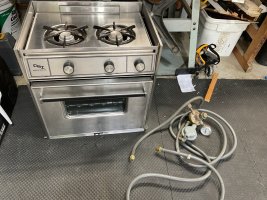From my reading, nat gas was considered very safe because, being lighter than air, it will escape the enclosed cabin into the atmosphere when leaks occur, as they do. Propane, being heavier than air required additional safety devices to minimize the chance of explosion resulting from the gas filling the cabin undetected. It is easy enough, I guess, to install a sniffer with an alarm to let a skipper know if explosive gas has settled in his bilge. (hopefully, that alarm is installed so as to be ignition proof). It is another thing to have the safety of automatically shutting off the gas on the stove if the flame is extinguished from a draft, or a spill from a pot.
As one who prefers to go without a seatbelt when driving around town, I will not judge someone who wants to simply change jets on a stove before fueling it with an odorless potentially explosive heavier than air gas for brewing their morning coffee. But maybe there should be a dayshape those folks could hoist so others docked nearby can have fair warning.



